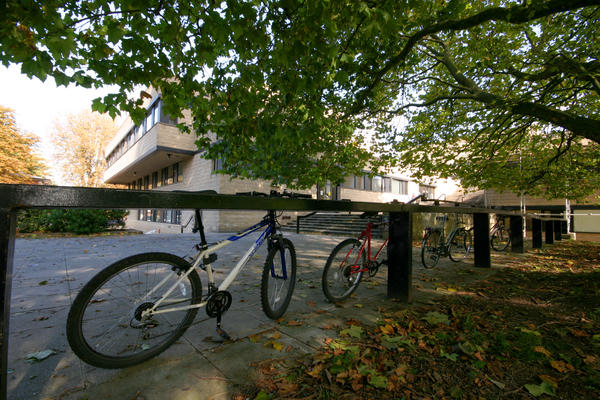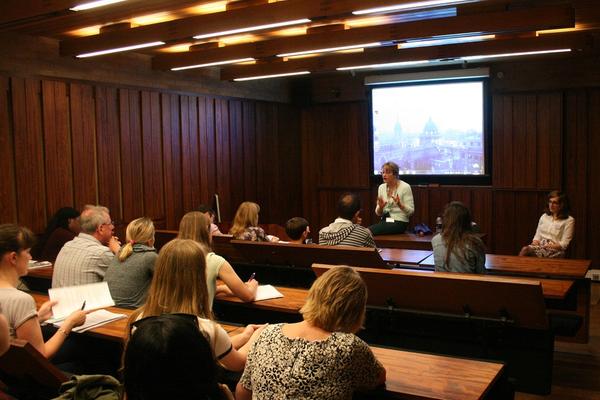Equality and Diversity
As a Faculty, we want to be a place where all our members feel included, and where we both support and celebrate the diversity of the people who work here.
Where can you find information and support?
This page gives links to a number of sources of information and support related to equality, diversity and inclusion. In the English Faculty, we have an Equality and Diversity Committee which brings people together from across the Faculty (academic and administrative staff; researchers; students) to review how we foster as inclusive an environment as possible in our teaching, research and administration.
The current Chair of that committee is Professor Siân Grønlie; students and staff are welcome to contact Professor Grønlie to ask about the work of the committee, raise issues and contribute ideas. Members of the committee are also part of the other groups and committees that help the Faculty operate, so that questions of equality and diversity are embedded in our decision-making process. We know that these questions are not simple, and are very often intersectional, interacting with one another. You can read the University’s policy on Equality and Diversity on the University website. The English Faculty is part of Oxford’s Humanities Division; resources and information about equality and diversity across the humanities at Oxford are available on the Divison’s equality and diversity pages.
Alongside support for students from their tutors and welfare teams in colleges, the University has a professionally staffed confidential Student Counselling Service for assistance with a wide range of personal, emotional and mental health, social and academic problems.
The Faculty’s teaching staff have experience of accommodating the particular needs of students to help them realise their potential. The Faculty’s Disability Officer for students is Andy Davice and you are welcome to contact him with issues about Faculty provision. He will operate with confidentiality, but be able to raise questions that affect students with the Equality and Diversity Committee. Many issues relating to disability and support will be handled by a student’s college. College websites include information about their disability officers and processes, and colleges liaise with the University’s Disability Advisory Service, whose website also offers a lot of information and advice directly for students, and who can assess students’ individual needs and provide support plans.
The Faculty’s Disability Officer for staff is Sadie Slater, who can be contacted with any issues relating to disability and your role.
The University does not tolerate any form of harassment or victimisation and expects all members of the University community, its visitors and contractors to treat each other with respect, courtesy and consideration. Harassment is defined in the University’s Harassment Policy.The English Faculty fully endorses this position. We seek to provide a positive and enriching environment for all our students and staff, and we expect our members to contribute to that environment, free from harassment.
If you have experienced an incident, or repeated incidents, of harassment, there are many people who are here to help you. You may want to discuss it with a tutor, a member of your college welfare team or a college harassment advisor. The University also has a network of confidential harassment advisors who can offer support. The current harassment advisors at the English Faculty are Professor Rachel Burns and Professor Andrew Klevan. The Humanities Division Equality and Diversity Officer, Dr Machilu van Bever Donker, is also a harassment advisor and mental health first aider. You can also speak to a Harassment Advisor outside your College or Faculty – contact details are available on the University website.
You can access all emails for students related to Covid-19 on OESS. Emails to staff regarding Covid-19 can be found on Sharepoint. For up-to-date news and advice from the University, please see the University of Oxford website.
The English Faculty is committed to racial equality, and is taking action to acknowledge racial injustice, embed anti-racist approaches in our policies and practices, and provide training and support in this area for our staff and students. We also play a full part in the work of the Humanities Divison Race Action Plan (that page also gives examples of current talks and events in the humanities that debate questions of race and racial equality). See also below for a number of Faculty initiatives that explore writers of all backgrounds.
The English Faculty was awarded the Athena Swan Bronze Award in May 2020. Athena Swan recognises commitment to the advancement of gender equality in higher education and research institutions. In our Faculty, we are trying to embed the principles set out in the Athena Swan Charter into how we work. We also believe that the principles of equality and inclusion that Athena Swan highlights are important for, and interact with, our work to challenge other kinds of inequity and prejudice.
The University of Oxford’s Equality and Diversity Unit is there to provide information and support across the range of equality and diversity issues. The University offers Equality and Diversity training and mentoring including:
- Implicit bias training
- Race awareness training
- Support for LGBT+ role models, mentoring & allies
Diversity Initiatives
Opening Oxford 1871-
Diversity and literature
Our undergraduate courses cover language and literature from the earliest writing from Britain, Ireland and beyond – before the idea of England or Englishness was established – to contemporary writing and other media in a variety of global Englishes. Our joint courses (known as joint schools) with History, Modern Languages, and Classics, extend this reach even further. We strive to be open to the languages and literatures of Britain and Ireland across those centuries, and the many other cultures with which English interacts. Understanding those long interactions and their contexts, including their entanglement in Britain’s imperial history and its legacy, is vital to this work.
Likewise, thinking about how literature and language study can embody, query and debate ideas about gender, race, sexuality, religion, health and disability, social relations (including region and class), and other pressing questions of equality and prejudice is one part of the work that we do in the Humanities. Apart from the close attention that our scholars and students give to this huge range of material through their studies, here are some particular examples of the way that Oxford researchers are opening up ideas and conversations about writing from across the globe, and from British writers of a variety of heritages and perspectives.














